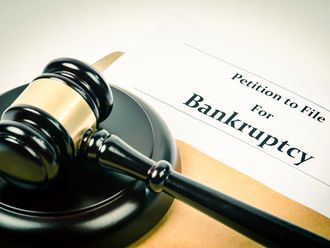Two months into the year and the Gulf region has had two debt issuances totalling $639.1 million (Dh2.4 billion). That's a relatively good start in contrast to the same period last year, when there was one bond issuance, worth just $108.9 million (Dh400.8 million).
However, the larger issuance of Saudi Dar Al Arkan's $450 million, five-year sukuk last month was almost $150-$250 million less than what it had hoped for because of a higher price of 11 per cent. Saudi Hollandi Bank was the other to tap the debt market. There are several in the pipeline, some more certain than others such as Bahrain's $1 billion sovereign bond. Saudi Aramco's $1 billion sukuk is also awaited. But a few, such as Bahrain's United Gulf Bank's $1 billion medium-term note, have been postponed without setting another date.
The record issuance of 2009, the big ticket ones being the sovereign papers from Abu Dhabi and Qatar later in the year, could very well be a reason for a go-slow approach until now, according to experts. This is expected to improve as the year progresses but perhaps not to the same levels of 2009. As for the lower investor appetite over the past couple of months, it has to do with market volatility because of international and regional factors.
"The confidence crisis around Greece is clearly having a wider international implication, while I also think a continuing concern about the economic recovery is adding to global volatility," said Jacco Keijzer, executive director and head of RBS's Middle East Debt Capital Markets.
Richard Fox, head of Middle East and Africa sovereign ratings at Fitch, added: "The region, to the extent that it's wanting to use the global capital markets to further its developments, can't be entirely divorced from the volatility arising from problems in high grade countries elsewhere. Abu Dhabi is a high grade country as well as is Qatar. So, yes, if global risks rise and fall and that is reflected in bond prices and yields, then its is going to be affecting the regional issuers as well."
What will happen
The big issue at home that is keeping investors busy is what is going to happen to Dubai World.
"It remains to be seen how the restructuring deal will look like and how it's accepted in the market," Fox said.
Abu Dhabi was among the most prolific last year, which observers believe led to the formation of a new debt management office.
"For Abu Dhabi, I think it definitely feels like the new debt management office will want to have a better handle on issuance in 2010," Fox said. "I think you will get issuance out of the Abu Dhabi public sector as the year progresses — but not before the debt management office feels that it is fully up to speed."
After last year's huge $7 billion government bond and Qatar Telecommunication's $1.5 billion debut bond, Qatar's situation is not very different from Abu Dhabi. Banks there are getting a lot of support from the sovereign funds.
Driven by consideration of being cash rich at the moment on the back of last year's big issuances in these two, the relative quiet is understandable, said Keijzer.
Looking ahead, Fox said: "As far as sovereign issuances are concerned, I don't think you are going to see the flood of issuance that you saw last summer."
Interestingly, the market has remained relatively stable on the secondary side. Going back a bit, the regional bond markets were reopened by both in 2009 at relatively wide spreads. Abu Dhabi and Qatar raised five-year money at 400 basis points (bps) and 300 bps over US Treasuries respectively.
Both were looking to establish liquid benchmarks and that was the reason for them to pay up that high, Keijzer pointed out.
On Tuesday last, for the five-year bonds of Abu Dhabi, it was paying 116 bps over spreads — that meant a yield of 3.3 per cent. And for the 10-year bonds, it was 153 bps over swaps, which was at 4.9 per cent. Dubai was much wider at 627 bps — which was a yield of 8.6 per cent.
Qatar's original five-year was paying 114 bps over spreads. Its 10-year bonds was at 143 bps.
Holding up well
"The spreads of Abu Dhabi and Qatari sovereign, corporate and FI bonds have mostly shown a solid performance and using the recent trading levels in those bonds as a benchmark you would expect that future deals will be well received," Keijzer said. "On this basis we do not necessarily expect to see a massively bumpy ride — also on the back of the latest rating clarification by Moody's around Abu Dhabi Government Related Entities. I think investor demand is going to be there."
So, the expectation is that UAE's oil-rich emirate and capital will issue papers as the year progresses but less than last year.
Keijzer believes the entities that will come to the market will be the ones that will be earmarked and singled out by the government as strategically important. Tourism Development and Investment Company, with its big developmental agenda looks a likely candidate. Mubadala and etisalat, both cash rich, may issue bonds only if the conditions are favourable and they have clear views about how best to utilize the money.
In the Gulf, as of now, the only definite plans have come from Bahrain, where the central bank has announced plans to issue a $1 billion sovereign bond with 10-year maturity.
On the corporate side, after the two massive defaults of Al Saad and Algosaibi in Saudi Arabia last year, the investors seem to be worried.
Looking at the region as a whole, continuing uncertainty with regards to law could act as a dampner, according to an analyst.
"I think you need to look at Malaysia to realise that there's fundamentally nothing wrong with sukuk itself. Malaysia has a good legal regulatory regime and investors have confidence," says Raymond Hill, head of emerging market corporates at Fitch.
In comparison, the Gulf countries seem to lag behind.
"There's an awful lot of regulatory uncertainty, concerning the bankruptcy law and the Sharia-compliance factor," said Hill. "The fatwa of 2008 which said that many of the sukuks are not Sharia-compliant is a case in point."
However, he points out Saudi Dar Al Arkan's $450 million issuance shows there's some interest in reviving the market.
As Hill points out: "Perhaps in certain territories, issuance by corporates out of Abu Dhabi or Qatar where the flood of cash seems to be abundant behind the economy as a whole [are different]. Given this, maybe investors in these territories are more relaxed on legal and strucural uncertainties which are probably ultimately just as puzzling as they are in Dubai."
So what sectors on the corporate side could see successful issuances? Here there's some hesitancy.
"The sectors that seem to lend themselves to sukuk structures are real estate-based, and real estate is in the doldrums and investors wouldn't seem to be interested in real estate assets. There is also the banking sector which has assets which can be packaged up and sold should there be investor appetite," Hill said.
When it comes to underlying industrial projects and the funding to pursue such projects, there seems to be some question marks.
Long-term appetite
Hill explained: "The region is trying to diversify away from hydrocarbons and is investing in chemicals and petrochemicals. These are global industries, which already have over-capacity issues, which begs the question will there be long-term investor appetite for these projects?"
Generally though, it is increasingly felt that investors seem to be taking a more granular view of the Gulf Cooperation Council and differentiating by a greater degree between the various emirates and countries and their respective government and corporate entities.
"In terms of primary markets investors can reasonably be expected to distinguish between Dubai and the rest of the GCC, with primary demand for GCC sovereign, sovereign linked and FI's expected to remain solid," Keijzer said.
"Even for Dubai entities we expect appetite for the stronger corporates to remains favorable and deals doable, although further clarification around Dubai World would be beneficial."












